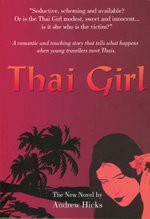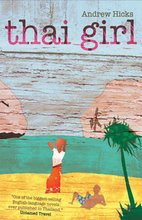
White Sands, Koh Chang less than two years ago.

Bamboo huts - a travellers' paradise lost.

And today... recognise the far tree from the first picture?

Room for a sexagenarian to swing his hammock.

The same spot last year, the huts all gone.

My coconut trees encased in concrete.

KC Grande resort from above. Nicely done but far too big.

Well padded holiday makers from another world.
We’ve just got back to our Surin village after a short holiday on the island of Koh Chang which gives me the chance to go on a bit about the current state of Thai tourism.
The village is a good place to avoid Christmas so we’re home again after a nine hour drive. The worst bit about leaving the island was saying goodbye to my daughter Anna and son-in-law Will who’d met up with us there for a short winter holiday.
They’ve visited us many times in Thailand but this time it wasn’t exactly easy for them. First of all it proved almost impossible to book a hotel from London as the Koh Chang resorts repeatedly told the booking agencies they were full and had no rooms. Finally they ended up staying at the new 160 room KC Grande Resort on White Sands Beach which proved to be almost empty of visitors.
The holiday was a cliff hanger too and they nearly cancelled when a mob of political demonstrators invaded and closed Bangkok’s Suvarnabhumi airport a few weeks before. Then at the last moment the protests came to an end and they were finally able to fly.
Thai tourism now looks pretty sick after this and it desperately needs a shot in the arm. With recession engulfing the world, long haul travel is an unnecessary luxury, added to which the strong baht now makes holidays here much more expensive. While I’ve been used to around 70 baht to the pound in the last few years, Thomas Cook in Petersfield gave Anna and Will only fourty four baht to the pound. Our pizzas on White Sands Beach were excellent but they now cost no less than in Europe.
Instead of getting a shot in the arm though, Thai tourism has been repeatedly shot in the foot. The Thai military which controls airport security allowed ‘The Peoples’ Alliance for Democracy’, a well organized anti-democratic rent-a-mob to take over the airport which was closed for many days, trapping 350,000 foreign tourists in Thailand and causing many more inward cancellations.
Nothing could be worse for the reputation of Thai tourism than this debacle. While the tsunami was far more catastrophic in human terms, it only affected one small part of the country.
As if these disasters are not enough!
One of the great advantages of visiting Thailand is the visa waiver that many nationals enjoy on arrival…you get an immediate thirty day stamp at immigration which is a big incentive to easy travel. But now they’ve changed the rules yet again. If you arrive overland you’ll now only be given a fifteen day stay.
Bang, bang, the message is clear. We don’t want so many travelers here… go to Vietnam, Cambodia and Laos instead. They’re far more welcoming.
Koh Chang profited after the tsunami as it’s safe from risk within the Gulf of Thailand. It also welcomed many backpackers, being well placed on the overland route to Cambodia, but in the last few years I’ve seen the character of White Sands Beach change from a sleepy traveller’s town to a resort attracting older tourists for short holidays in the sun.
When Ben the protagonist of my novel, “Thai Girl” stayed on this beach in 2001 he predicted an ecological disaster and he was dead right. Bang, bang, they’ve turned the west side of the island into the usual grubby shambles of tacky stalls and huts spread out for mile after mile in headlong pursuit of the tourist dollar. Thailand is incapable of controlling informal development even here on the fringes of a national park and they’ve destroyed much of the natural environment that is the chief attraction for many visitors. The sea and mountains are still there but much has been lost in a short time even as boom turns to bust.
A few years ago the Thaksin government proposed reserving Koh Chang for up market tourism, a good idea so long as the rest of the island isn’t ruined by low grade developments. In that light the recent expansion of Anna and Will’s KC Grande resort could be justified but I’m sad at what’s been lost in the process.
In my recent book, “My Thai Girl and I”, I describe how we stayed in one of the old bamboo huts at KC Grande for my sixtieth birthday and I’m still not yet sixty two. The next time we visited Koh Chang the huts had all gone and construction of the new resort was well under way. Now it’s open for business though some of the bar areas are still not quite complete. Thai-Chinese owned and partly financed by Swedish interests promoting package tourism, I’m told, it has been planned and finished to a very high standard indeed.
I wish them well and hope that their enterprise brings employment and benefit to ordinary people here, but I also wish the resort wasn’t so big and that it hadn’t replaced my bamboo huts with steel and concrete and the brutal sea wall that now blights the beach front. The coconut trees from which I used to sling my hammock have either been chopped down or embedded in concrete.
The resort has opened at a terrible time. Christmas and New Year season will be busy but who knows what will happen after that. Thai tourism really doesn’t need any more shocks.
I’m unable to verify the story but this is what I’ve just been told by a usually reliable source. In Thailand the foreshore is vested in the Crown and is controlled by the military for strategic reasons. On Koh Chang the generals have been rattling sabres saying that the beach resort developments are illegal and that they must all be closed and cleared away. Meetings are now being held and heavy negotiations are in progress.
So does this mean, bang bang, that tourism on Koh Chang will be decimated or that all resorts will be moved back from the beach?
Well, no actually… this is Thailand, where nothing is ever what it seems.
In Buddhist terms all of human striving is illusory, impermanent and unsatisfactory. Three prime ministers in three months isn’t bad going but the new cabinet ministers are wearing impressive white uniforms and keep smiling benignly. Next year the visa rules will change again and the beaches on Koh Chang will look much the same as they do today. The pace of development will slow a little because of recession but we’ll never know what was resolved with the military, though we may well speculate.
The losers from the tourist recession will as always be the little people… the ones selling tee shirts from a tiny stall on the street, the cooks and cleaners who’ll lose their jobs, but’s that’s just how it always is.
Koh Chang is still wonderful though. After we’ve done what we have to do here in the village, we’re planning to head back there for the New Year. A round trip’s only fifteen hours driving after all and as an added bonus the ferry service is the best in the world.
Where else do they charge only a few dollars a head while the car goes on for free?
Andrew Hicks The ‘Thai Girl’ Blog December 2008




















































